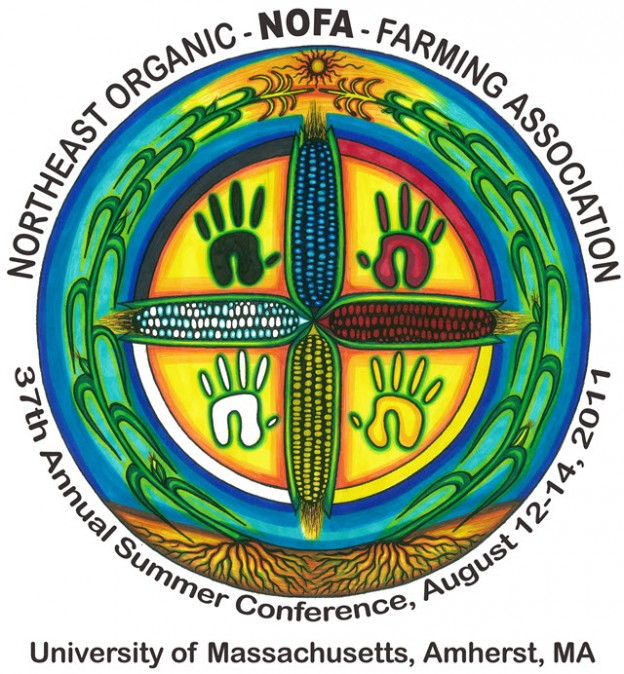
Lee Reich first attended the Northeast Organic Farming Association (NOFA) summer conference in 1978. Having received his B.A. in Chemistry from the University of Wisconsin and in the midst of two Masters degrees — the first in Soil Science, the second in Horticulture — Lee found many attendees at NOFA who shared his passion for the natural world.
This weekend, Lee returns to NOFA’s 37th summer conference (August 12-14th in Amherst, MA) to deliver back-to-back workshops, the first of which is on the subject of his doctoral dissertation — blueberries–and the second of which is titled Useful & Special Fun Pruning Techniques.
Special fun pruning techniques??
NOFA is comprised of farmers, gardeners, landscapers and consumers who work to educate the general public about the benefits of local organic systems. Jack Kittredge, a NOFA organizer and head of the summer conference since the 1980s, says that the annual NOFA event draws people who “are looking to be more connected to their lives, whether that’s seeking out holistic healers, building their own homes, homeschooling their children or growing their own food.”

Jack Kittredge, former director of the NOFA Summer Conference
Workshops at this year’s NOFA summer conference range from using animal power in the fields to creating herbal medicines to making country wine (the NOFA Summer Conference website gives a full listing of the workshops). But the conference is not just for existing farmers, gardeners, builders and healers. It’s for anyone interested in cultivating certain aspects of their lives, outside of the “consumer mentality,” in the words of Jack Kittredge.
Blueberries will be a hot topic at this year’s conference, not only because Reich is a popular presenter, but also because of the public’s interest in the health benefits of the fruit. Virginia Wright, author of The Wild Blueberry Book, notes that blueberries can protect against urinary tract infections, contain antioxidants and vitamins essential to ocular health, reverse some of the effects of aging and even promote virility in men! “The Japanese have become enthusiastic consumers of wild blueberries…” writes Wright. “They wolf down blueberry pasta, blueberry pizza, and blueberry curry, along with many of the same products westerners enjoy.”
Besides being nutrient-dense, blueberries are a wonderful addition to the landscape. Lee Reich believes they can enliven any backyard. His first workshop will give his audience tools to choose from a variety of blueberry seedlings, tend the soil, protect berries against birds and harvest their berries. His second will be a more in-depth study of pruning techniques, such as the Espalier method, more common in Europe, that expose more of the plant to sunlight.

Lee Reich, Presenter at the 2011 NOFA Summer Conference
Lee hopes that his workshops will get more people to garden themselves. He sees the local food movement as a good thing; however, he would rather that people get their hands dirty than pay for others’ produce. “People garden because it’s fun,” says Lee, “you do something to a plant, and you see it’s reaction. And there are certain things, certain tastes, you can only appreciate if you do it yourself. For example, a head of lettuce, picked at a CSA in the morning will be good in the afternoon, but it will be incredible if it’s picked just before dinner. Asparagus is also more flavorful when freshly cut.”
1400 people attended the conference in 2010. Many camped, while many others opted to stay in UMass dorm rooms. The University prepares meals with ingredients sourced from local farms. For those who want a break from workshops, topical films are shown throughout the weekend. Two keynote speakers anchor the conference. This year, Eric Toensmier will speak on “Regenerative and Perennial Agriculture for Climate Stabilization,” and Ignacio Chapela will speak on “Food Sovereignty against the Financial, Climatic, and Transgenic Disruptions of Agriculture.”
In many ways, the NOFA summer conference is a celebration of the hard work that people are doing to promote more holistic ways of living. As opposed to the 1970s, when the conference was more counter-culture, aspects of this weekend’s conference are quite chic. In particular, more people are questioning where their food comes from and how they can be assured that what arrives on their plate is free from certain chemicals and hormones.
In the final analysis, this conference is a place for those who value good food, as part of a whole life, to gather to support one another.
For tickets and more information about the 37th Annual NOFA Summer Conference, visit their website.
